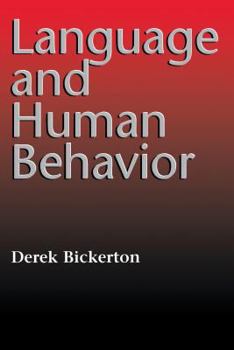Language and Human Behavior (Jessie & John Danz Lectures)
Select Format
Select Condition 
Book Overview
According to Bickerton, the behavioral sciences have failed to give an adequate account of human nature at least partly because of the conjunction and mutual reinforcement of two widespread beliefs: that language is simply a means of communication and that human intelligence is the result of the rapid growth and unusual size of human brains. Bickerton argues that each of the properties distinguishing human intelligence and consciousness from that of other animals can be shown to derive straightforwardly from properties of language. In essence, language arose as a representational system, not a means of communication or a skill, and not a product of culture but an evolutionary adaptation. The author stresses the necessity of viewing intelligence in evolutionary terms, seeing it not as problem solving but as a way of maintaining homeostasis - the preservation of those conditions most favorable to an organism, the optimal achievable conditions for survival and well-being. The term protolanguage is used to describe the stringing together of symbols that prehuman hominids employed. It did not allow them to turn today's imagination into tomorrow's fact. But it is just this power to transform imagination into fact that distinguishes human behavior from that of our ancestral species, and indeed from that of all other species. It is exactly what enables us to change our behavior, or invent vast ranges of new behavior, practically overnight, with no concomitant genetic changes. Language and Human Behavior should be of interest to anyone in the behavioral and evolutionary sciences and to all those concerned with the role of language in human behavior.
Format:Hardcover
Language:English
ISBN:0295974575
ISBN13:9780295974576
Release Date:January 1995
Publisher:Univ of Washington Pr
Length:180 Pages
Weight:0.60 lbs.
Dimensions:9.5" x 0.8" x 0.8"
Customer Reviews
2 ratings
Human Cognition Came Out of Syntax
Published by Thriftbooks.com User , 21 years ago
If you like Dennett's books, I urge you to read this one, "Language and Human Bahavior", by Bickerton. The whole book, which is not long, developes a single argument clearly and cogently. It is Vytgotsky's argument (see "Thought and Language" written in 1934), but updated and expanded. In Bickerton's own words: "human cognition came out of language" (page 160), though the title of this review is more exact. So Vygotsky from psychology and Bickerton from linguistics reach the same heretical conclusion. I believe very deeply that they are right.Summary: The book is very interesting and very well written; it was easy reading for me. It deserves the best score and I strongly recommend it.
Intelligence came from language, not vice versa
Published by Thriftbooks.com User , 25 years ago
It is easy to suspect that we humans can talk because we have smart brains. Bickerton instead argues that as our brains developed the capacity for speech we thereby became smart. Like other animals we have "on-line" thinking to help us survive. This consists of sensory('objective') knowledge of the world and ('subjective') inner states of consciousness. These latter are sometimes automatic responses to sensory knowledge --when you see a lion slinking, run! Sometimes they are awareness of inner states such as pain or body position. On-line thinking is automatic, either instinctual or a kind of learned stimulus-response process. But humans also have "off-line" consciousness. This consists of mental representations of the world and of ourselves, but even of events that are not really occuring. We can think about things not present to us, far away or in the past or in possible futures. So we can evaluate possibilities and make choices in our head; we can plan ahead. Bickerton uses his expertise in pidgin and creole languages to compare different kinds of thought. By this he shows that full "online" thinking is much more than koko, washoe, and kanzi, the sign-using primates (and two-year old children for that matter) are able to do. How he gets from pidgin and creoles to his conclusions is a major aspect of the book. He does it clearly and elegantly. Overall, he argues that as the mind developed capacity for full language, it was also developing the capacity to formulate, hold on to, and manipulate concepts and the relations among them. This language skill is also skill at thinking. So as the human brain developed the structures and connections to make language possible, this created the possibility of offline thought--the power to manipulate ideas well beyond the limits of ordinary "online" sensory experience and flash responses to those experiences.





